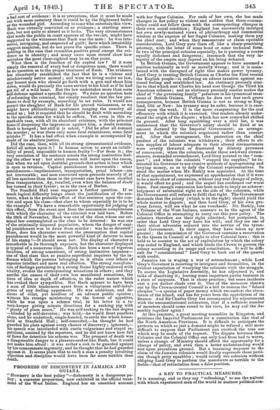PROGRESS OF DISCONTENT IN JAMAICA AND GUIANA. a HONESTY' IS
the best policy "—dishonesty is a dangerous po- licy; a converse proposition, now exhibited in the official treat- Meat of the West Indies. England has an unsettled account
with her Sugar Colonies. For ends of her own, she has made changes in her policy so violent and sudden that those commu- nities could not follow them with the corresponding changes in their own social condition ; England has successively indulged her own newly-matured views of philanthropy and commercial wisdom at the expense of her Sugar Colonies, making them pay the chief cost; and when they remonstrate or claim equitable consideration, Lord Grey puts them off, like a sharp-practising attorney, with the letter of some bond or some technical form. In two of the principal colonies especially, he is pursuing a course equally dishonest and dangerous; insomuch that the very in- tegrity of the empire may depend on his being defeated.
In British Guiana, the Government appears to have assumed a position technically as well as morally wrong; and it is main- tained with the disregard of right that makes power tyranny-. Lord Grey is treating British Guiana as Charles the First treated the English people—is enforcing an odious taxation against na- tional feeling and established law. An obstinacy precisely simi- lar to that which cost Charles his head cost George the Third his American colonies; and an obstinacy precisely similar makes the chief of "the governing family" persevere in his tyrannical treat- ment of British Guiana. Perhaps he does not fear such grave consequences, because British Guiana is not so strong as Eng- land, Old or New: his tyranny may be safer, because it is exer- cised upon the weak. It is the more exasperating for the cool effrontery with which it is exercised. Our readers already under- stand the origin of the dispute ; which has now somewhat shifted its ground. After long squabbling over a civil list, it was understood that the Governor's salary should be fixed at an amount dictated by the Imperial Government; an arrange- ment in which the colonists acquiesced rather than concur- red. After that arrangement, the protection on the chief product of the colonists was withdrawn ; their efforts to ob- tain supplies of labour adequate to their altered circumstances were overtly thwarted or frustrated by dilatory pretences of concession; when the colonists, under those awkward circum- stances, demanded retrenchment, Lord Grey pointed to the "com- pact " ; and when the colonists "stopped the supplies," he in- structed his Governor to use evasive methods of appropriating and levying money, so as to defy the Colonial representatives. So stood the matter when Mr. Barkly was appointed. At the time of that appointment, we expressed an apprehension that if it were to be a mere show of concession, without any real change of policy, it would effect no good ; and the sequel has confirmed our worst fears. Just enough concession has been made to imply an acknow- ledgment of substantial right on the side of the colonists, while the Government still refuses to fulfil that right. The Government demands that the colony (which is in the right) should yield the whole matter in dispute ; and then Lord Grey, of his own gra- cious favour, will see what he can vouchsafe. Mr. Barkly, late a Tribune of the \Vest Indians, consents to be the agent of the Colonial Office in attempting to carry, out this poor policy. The colonists therefore see their right admitted, but postponed, in order that Lord Grey may have his will; and they see one of their ablest advocates seduced into the service of the tyran- nical Government. In their anger, they have taken up new ground : the commission of the Governor contains a reservation to the Queen in Council of a right to alter Colonial laws : this is held to be counter to the act of capitulation by which the colony was ceded to England, and which binds the Crown to govern the colony according to its usage and constitution. It will be diffi- cult for "constitutional" Lord Grey to back out of the quarrel with credit.
Jamaica too is waging a war of retrenchment ; while Lord Grey's Governor is resorting to intrigues and formalities, in the evident expectation of wearying the colonists with the struggle. To coerce the Legislative Assembly, he has adjourned it, and talks of dissolving it; leaving some important public business in a state of suspense. That is sharp practice ; but some incidents cast a yet darker shade over it. One of the measures thrown out by the Crown-created Council is a bill to redeem the "Island cheques "—a species of paper money which encumbers the circu- lation of the island, and has for years been the opprobrium of its finance. And Sir Charles Grey has accompanied his adjournment with the unconstitutional intimation, that if a sufficient number of members should come round to his view, he may call the As- sembly together again At this juncture, a great meeting assembles in Kingston, and petitions the Imperial Parliament for a constitution like that of the North American Provinces. It is difficult to anticipate the pretexts on which so just a demand might be refused ; still more difficult to suppose that Parliament can overlook the true use which may be made of the request. The dispute between these Colonies and the Colonial Office can only lead from bad to worse, unless a change of Ministry should afford the opportunity for a change of policy, and even then a better understanding would rest upon precarious ground. But a becoming response to the claim of the Jamaica colonists would finally supersede these peril- ous though petty squabbles ; would satisfy the colonists without obliging Lord Grey to perform the manceuvre so terrible to the feeble—that of retractation from a false position.


























 Previous page
Previous page